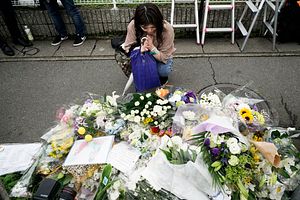After Thursday’s arson attack at Kyoto Animation Studio, taking the lives of 34 artists, mourners from around the world gathered at the makeshift memorial site to lay flowers and pay their respects. An outpouring of online tributes from anime fans thanked the artists for their unforgettable storytelling and dedication to beautiful animation.
Last Friday, Japanese Prime Minister Shinzo Abe described the attack as “horrifying” and “too appalling for words.” Leaders in the international community and industry creatives have also offered their support to the legendary animation studio. Canadian Prime Minister Justin Trudeau took to Twitter to offer his condolences. Meanwhile, UN Secretary-General Antonio Guterres added the “UN stands in full solidarity with the government and the people of Japan.” Apple CEO Tim Cook condemned the attack as “a tragedy felt far beyond Japan” and praised the studio as a “unique force in the anime industry.”
The majority of victims were in their 20s and 30s and were considered part of the elite of the animation world. Kyoto Animation Studio, affectionately called “KyoAni” by fans, had a reputation for hiring a majority of female artists to produce anime and manga with strong female leads and storylines. In the highly competitive and male dominated animation industry, KyoAni was recognized for its unique approach to training and fostering talent in-house.
However, the studio’s unusual practice of housing all creative development and the production process under the one roof has come under fire for amplifying the death toll. When the fire broke out, 74 people were working inside in the building.
With the attacker setting fire to the building’s entrance, victims had few options for escape. Local fire officials say the bodies of 19 victims were found in the emergency evacuation stairwell between the third floor and the rooftop, where they suffocated while unable to open the door to the roof. The deadly fire, fueled by petrol, is said to have spread quickly due to the lack of sprinklers and was exasperated by a spiral staircase that funneled the fire up to higher floors.
Local residents requested that the charred concrete building be demolished as soon as possible to make way for a memorial park. The president and founder of the studio, Hideaki Hatta, said he was considering hosting a memorial ceremony for the victims of the fire. Besides the 34 dead, another 34 victims were hospitalized. A GoFundMe donation page titled “Help KyoAni Heal” has so far raised almost $2 million to support the victims’ and studio’s recovery. It is not clear whether the studio will be able to recuperate from its losses with all past animation materials and upcoming book and film projects destroyed in the fire.
Studio president Hatta said he was speechless at the loss of the most talented and rising stars of the Japanese anime industry, some of whom had only joined the company in April as their first industry job. In an interview with journalists on Saturday, Hatta denied any links to arson suspect Shinji Aoba, stressing he had never heard the name before. He said he had no clue what the assailant meant by yelling about the theft of his idea before starting the fire. However, Hatta admitted the company had received a number of anonymous death threats via email, which he said were dealt with “sincerely.”
Suspect Shinji Aoba, 41, was a disgruntled gamer who allegedly told police the attack was motivated by the theft of his novel, which he said was plagiarized by the studio. Kyoto prefectural police said the suspect suffered severe burns to his entire body and was hospitalized in Osaka. Although police have obtained an arrest warrant under murder and arson charges, it won’t be executed until his discharge from hospital.
Personal details on Aoba reveal a troubled past. He was arrested in 2012 for robbing a convenience store in Tokyo and consequently served a three-and-a-half year prison term. Residents say Aoba was known as a recluse and frequently received noise complaints from neighbors in his apartment complex. Japan’s public broadcaster, NHK, reported that Aoba had a history of mental illness and had been housed in a rehabilitation facility in Saitama — the prefecture neighboring Tokyo — following his stint in prison.

































